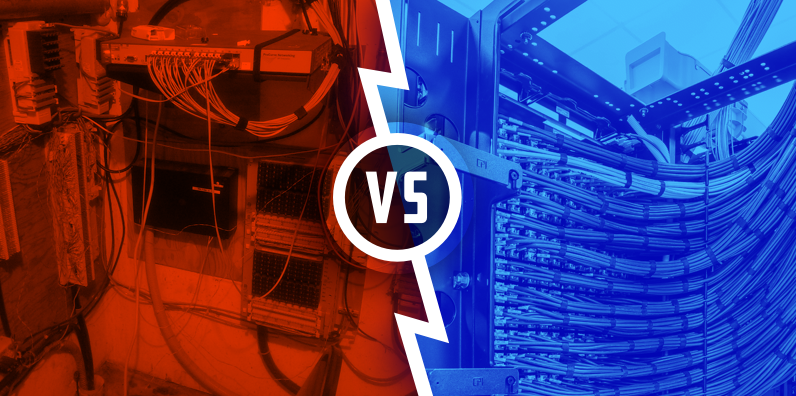
The Data Center Dilemma: Understanding In-House Solutions Versus Colocation
In the contemporary enterprise landscape, data centers are key drivers and enablers for all things digital business. Whether it’s adopting new applications, incorporating new added-value services for end users, or creating more seamless IT frameworks for better collaboration and productivity, the data flows created and used by the enterprise are more robust than ever. To support these flows of information, data centers provide vital networking, redundant power and cooling infrastructure, business continuity, and information security benefits that are absolutely crucial for enterprise success. While the importance of the data center is clear, the question of whether to maintain an in-house data center strategy or an outsourced colocation approach still remains.
Colocation and in-house data centers both bring benefits to the table, and differing business cases can call for different strategies depending on business goals, current requirements, company size, growth expectations, and more. To guide the enterprise as it seeks the best method for its own unique needs, we’ve gathered the most salient information on both strategies below.
In-House Data Centers Explained:
An in-house data center is when a company houses its servers, networking hardware, or other necessary IT equipment in a facility that is owned and run by the company itself, often within their corporate office. In-house data centers were a very common strategy for a long time. One of the main advantages of an in-house data center is complete control and companies are always in touch with their data and are free to change or expand on their own terms as they need it. All the hardware is close by and completely under the care of the business itself, so any troubleshooting or operational tasks can be accomplished on-premise.
However, this complete control also leads to some of the less beneficial elements of on-premises data centers, namely the amount of expertise, human capital, money, and time they require for maintenance, growth, and operations. As demands on businesses expand, data centers are getting bigger, more complex, and more time consuming to maintain, and their needs are beginning to outstrip the resources of many enterprises. The knowledge and talent gaps across the technology sphere mean that companies are having a harder time finding employees with the right skills to maintain increasingly complex and cutting-edge IT.
Curious to see what we can do for you? Schedule a tour today to see our new, master-planned Texas 2 Data Center, or get a quick quote to see how much your organization can save today.
What is a colocation data center?
A colocation data center on the other hand is the data center option where hardware and IT equipment (while still owned by the enterprise) is housed in a secure third-party facility. While this method does make data access a bit more indirect and puts some distance between businesses and their equipment, there’s a reason why colocation continues to rise in popularity and is expected to generate yearly revenue of $54 billion per year by 2023.
Some of the biggest selling points of colocation are the expertise, 24/7 support, and world-class infrastructure it lends to clients. Colocation outsources IT equipment housing and management to experts, meaning that the enterprise is getting the best of facility maintenance, monitoring, uptime, and protection against power failures, data breaches, and beyond. On-site personnel are available and highly knowledgeable, meaning that businesses can rest assured that their IT is in good hands. This also means that much of the burden is taken off of the enterprise, and all that capital, manpower, time, and more can be reallocated back toward core strategic business initiatives.
Colocation also offers flexibility and scale that in-house data centers often can’t, delivering abundant room to grow and change with data demands. They also offer more robust connectivity, which is becoming increasingly important as today’s data becomes more distributed and decentralized, as business footprints become more disparate and as enterprises require seamless connections to a growing number of platforms and applications.
Keys to a quality colocation data center:
While colocation is gaining an increasing share in the market as the data center solution of choice, this option is only as good as the partner that’s chosen to deliver it. Not every provider delivers the same care, the same redundant infrastructure, or the same physical security, so finding the right provider is the most important part of any data center selection.
Data Foundry’s Texas 2 data center provides an ideal facility to support the wholesale and retail colocation needs for deployments of any size. At 325,000 square feet, this state-of-the-art, carrier-neutral data center offers 36MW of power with built-in redundancy and uninterruptible power supply (UPS), a concurrently maintainable chilled water-cooling system with dual, independent water feeds to empower high-density, high-performance computing, and more. The facility also delivers a cloud access network fabric, blended bandwidth for the most efficient and reliable network connectivity routing, and a private fiber network that links to all other Data Foundry locations in Texas.
Beyond the physical robustness and reliability, however, the main difference Data Foundry delivers is in its high-touch customer service. Data Foundry was built on the belief that IT teams need to be supported and empowered just as thoroughly as IT equipment, which is why Data Foundry is dedicated to offering responsive, expert, always available, and hands-on support.
Learn more about the ins and outs and the benefits of a colocation data center. Schedule a tour of Texas 2, today. To learn more about the facility’s offerings, please click here.
